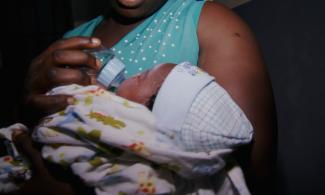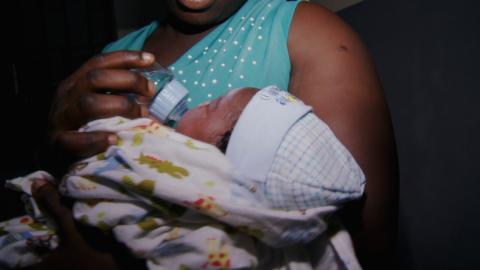
Uneasy was the countenance on Ebele Nwaka as she struggled to climb down one of the stairs of Asokoro District Hospital.
Uneasy was the countenance on Ebele Nwaka as she struggled to climb down one of the stairs of Asokoro District Hospital.
Mrs. Nwaka is carrying a seven-month-old pregnancy and she is an albino.
As our correspondent helps her down the stairs, she complained bitterly.
“I came to see my doctor but none of the nurses who normally help me are around. They say they are all on strike. I am going through pains.”
The Asokoro facility where Mrs. Nwaka receives antenatal care is one of the many state hospitals in the country that last Thursday, joined the Health Worker’s strike which has been on for a month now.
When the strike commenced on April 17, federal hospitals across the country were crippled, until last Thursday when the situation worsened as the states and local governments joined, in a bid to force the government to act.
As the strike continues unabated, the situation is worsening for pregnant women and nursing mothers in dire need of either post or ante-care. This is because of essential staff, nurses and midwives — some of the most influential members of JOHESU — have all downed tools.
Pregnant women may be cared for by an Obstetrician but the role of midwives and nurses during and after pregnancy can never be over-emphasized and Mrs. Nwaka is living the pain of their absence.
There were beats of blood on her toes as she was helped out of the almost empty facility.
Some of the administrative staff at the reception were all chatting in a jolly mood. There was no work to do or patients to attend to.
An attendant over the registration counter who was busy playing a video game on his phone told our correspondent that the facility is only open for an emergency.
“Only our emergency and accident ward is fully open.”
Armed security men were at the gate. They say they are there to make sure the striking health workers do not disturb doctors attending to patients.
The situation was the same at the Kubwa general hospital in Abuja. Services were halted as most of the staff were not on duty.
As compared to the usually crowded corridors and waiting rooms, the hospital environment was quite empty.
Most of the waiting rooms were open but there was nobody inside.
A few doctors were seen on the ground, especially at the emergency ward, attending to patients
The male surgical ward had less than five patients while there was no patient at all at the Eye clinic and physiotherapy section.
However, the cash point at the accident and emergency section was opened for patients who have to pay for services.
Speaking to the cashier who refused to give her name, she said though health workers are on strike, they are performing skeletal services.
A nurse who pleaded anonymity said though they are on strike, she decided to come around because she pities the patients.
The nurse who was not in her uniform said many patients still visit the hospital in spite of the strike.
“People still come, not knowing health workers are on strike. I am not happy about the strike, but what can we do than to join them."
“I am not aware of any fatality at the moment, but it's unfair because many people have been seeking professional help from private hospitals and that is very expensive. Many people cannot afford the bills”, she lamented.
The head of nursing at the facility refused to speak with our reporter.
According to her, she is not liable to talk about the strike or the effect it has on the hospital.
Both Maitama General Hospital and the Wuse District hospital in Abuja bear a tell-tale sign of desertion.
While the post/antenatal care section at the Wuse hospital was shut, the Maitama facility was practically empty, starting from the reception.
It was observed that both facilities are performing skeletal operations.
The nationwide strike was called by JOHESU (Joint Health Sector Union) an association comprising all other health workers except doctors.
Their demand, among others, is for the government to increase their pay.
In the first week of the strike, PREMIUM TIMES observed the level of compliance across federal health institutions in Abuja.
Then, a woman in labour was seen struggling with her condition and nurses and midwives were not around to attend to her.
The government is now in dilemma on how to end the strike especially because of the threat of doctors. The doctors’ union, NMA, says it would commence strike if the federal government accedes to the request of JOHESU on salaries.
On Monday, the health workers’ union, in response to the doctors’ threat, accused the NMA and the health ministry of sabotage.
Negotiations are, however, ongoing between the government and the health workers to resolve the strike.
